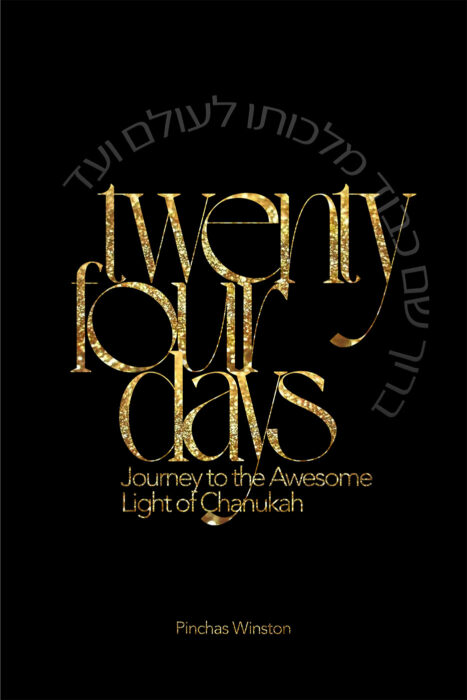Parashas Devarim-Shabbos Chazon, Issue #855 – By Pinchas Winston
How can I carry you as a burden by myself, with the trouble you cause, and your fighting? (Devarim 1:12)
THE FIGHT FOR life is the fight for spiritual sensitivity. Everything good about a person flows from that. This is evident from all of history, but especially so from today’s society. There have always been rude people, but never has rudeness become such a part of the daily landscape.
Greeks could be rude as well. It is a natural instinct, perhaps even part of human survival. But, when the Greeks went to the theatre, only the bad guys were impolite. The good guys were always the one’s trying to act nobly. Even gladiators probably didn’t “trash talk” one another.
Man was made in the image of God. This means that he has the capacity to act Godly, with “Derech Eretz.” He can be a “mentsch.” His body, however, was created in the image of the animal world, and that gives a person the capacity to act like one.
Rav Wolbe in “Aleh Shor” explains that man’s defining characteristic is his ability to pray. He points out that animals can do many of the things that impress us about ourselves, including building things. But animals cannot pray, something that is unique to man.
What this really means is that man should first-and-foremost be a “spiritual being having a physical experience.” Animals are just the opposite. They are physical beings with a minimal amount of spiritual potential. But they don’t need more than that, because they were not given free will to increase their Godliness. They are exactly what they were created to be, and this is as spiritual as they need to be.
Obviously spirituality is a function of one’s belief in God. The more one believes in God, the more spiritual they will be. The less spiritual a person behaves, the less they believe in God, EVEN IF THEY ARE RELIGIOUS. The two go hand-in-hand and are inseparable, and the fight for life is to remain spiritual so that one can remain Godly.
But that’s not what the body wants. It came from the ground and wants to go back to the ground. Death is the fastest way, but it will settle for a waste of life. It has emotions such as material desire, jealousy, and hatred, etc., in its arsenal. It does not hesitate to use any to its full advantage in its war against spirituality when the opportunity arises.
The trouble with spiritual wars, unlike physical wars, is that you don’t necessarily know when you are fighting one. In conventional wars, when the bullets fly, you can hear them whiz overhead, or hit some target. When spiritual bullets fly, a person can obliviously be having the time of their life. It is usually only after there has been a consequence that a person realizes the danger they HAD been in.
That’s this week’s parsha. That’s Eichah that we will read on Tisha B’Av. Each is a look-back, a lesson for the future based upon the failures of the past. How? That’s what Eichah asks. How did you do it? How did you start so high and end up so low? How did you build so much and end up destroying even more?
The answer: spiritual desensitization.
Spiritual sensitivity is an ongoing battle. If it is not being maintained, it is being drained. If someone is not working hard to keep it strong, the yetzer hara will work hard to make it weak. Needless to say, it has done just this to most of the world’s population ever since leaving the Garden of Eden, and even while still there.
This is what we’re supposed to think about on Shabbos Chazon. This is what we’re supposed to recall, sitting on the floor and reading Eichah on Tisha B’Av. We’re supposed to recall, while going one-by-one through the Kinos, how many times we forgot this message, and what it has cost us throughout the ages. THAT is the beginning of the tikun, the initial steps in the direction of redemption.
Along these lines but a little bit different, my latest book about dealing with suffering, “Point of Acceptance,” is now published.
Part 2: Reincarnation
Sha’ar HaGilgulim: We begin with what Chazal have written, that the soul has five names. Their order, from bottom to top, is: Nefesh, Ruach, Neshamah, Chayah, and Yechidah. Undoubtedly, they are not called these by chance.
Commentary: It would be more accurate to say that the soul has five parts, each with its own name. In general, every person has one ESSENTIAL soul for which they are responsible to rectify, though others may join it in a single body during any given incarnation.
The names of the levels are definitely not random. A soul is a “portion” of Divine light, and the five names allude to the status of that light at different stages of its journey from its Source, Ain Sof, to the body of a person.
At is source, “Ohr Ain Sof,” the “Light Without End,” is far too spiritual to be contained by anything physical like a body. Even angels can’t exist on higher levels, so how much more so man, for whom Creation was made.
Therefore, the light must be constricted, allowing its level of spirituality to be reduced sufficiently to eventually allow physical people, and of course free will, to exist. The names of the soul levels indicate at what stage of the constriction process—tzimtzum in Hebrew —the light is at.
The highest level of soul is called “Yechidah,” which means “singular.” On this level, the light is so sublime that complete unity exists. We really have no idea what the reality of this light is like, since there is nothing in human experience to which it can be compared. For all intents-and-purposes, the discussion of the soul begins on the next level, “Chayah,” or “Life.”
This level of soul is called “Life,” because it is considered to be the “recognizable” source of the levels of light below it. When Adam HaRishon was first created, he had access to this level of light and soul. However, as is discussed later in Sha’ar HaGilgulim, this changed because of his sin, and now Chayah is also beyond our grasp and experience.
The word “Neshamah” comes from the word “neshimah,” which means “breath.” This level of soul is compared to the breath that a glassblower takes into his mouth before blowing down a tube to shape molten glass at its other end. Once he releases the breath, it forms a “wind,” which corresponds to the second last level of soul, “Ruach,” which means “wind.”
The fifth and final level of soul is called “Nefesh,” which means “rest,” because it is on this level, the level of the body that the Divine light finally ends its journey. Often called the “Animal Soul,” it is the source of energy responsible for allowing the body to live and perform all of its physical functions.
Though this level of soul is on a much lower level of spirituality than the levels of soul above it, it is still COMPLETELY spiritual. It is not physical at all, and therefore it remains INVISIBLE to the eye. Using physical means to detect its existence is completely futile.
Sha’ar HaGilgulim begins with a discussion about the five levels of soul because they are the basis of the entire work. If everyone has ALL five levels of soul, then why are people on VERY different spiritual levels? How do people become more, or less spiritual, during their lifetime?
It has to do with ACCESS to soul levels. All five soul levels are there in a person from birth, but not everyone has access to the same level of soul from the start. The higher the level of soul a person can access, the more spiritual they will be, and vice-versa.
Thus, if a person during a lifetime extends their access to a higher level of soul by performing a mitzvah, they will become more spiritual. If a person at some point during their life loses access to their current level of soul by sinning, they will become less spiritual.
Sha’ar HaGilgulim details the impact of both, acting as THE guide to achieve the former and avoid the latter. Like any system in life, the more one understands how it works, the more one can use it to their advantage.
Pinchas Winston
Thirtysix.org
Download The PDF Version



















